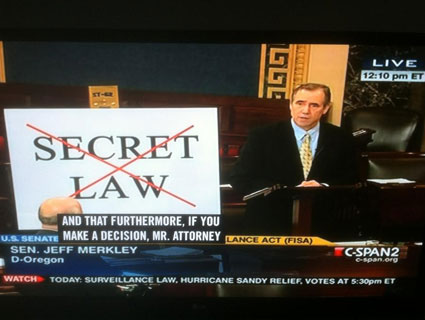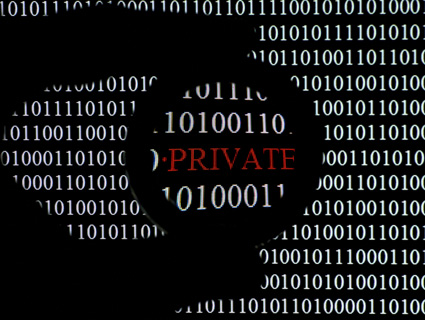
<a href="http://www.shutterstock.com/cat.mhtml?lang=en&search_source=search_form&search_tracking_id=8D4B5C06-80FB-11E2-8557-12CDACE6966E&version=llv1&anyorall=all&safesearch=1&searchterm=secret&search_group=&orient=&search_cat=&searchtermx=&photographer_name=&people_gender=&people_age=&people_ethnicity=&people_number=&commercial_ok=&color=&show_color_wheel=1#id=123969352&src=B54747F6-80FB-11E2-BED0-12CDACE6966E-1-20">Eugene Sergeev </a>/Shutterstock
Just because you’re paranoid doesn’t mean that they’re not after you. But you’ll never be able to prove it.
That’s the gist of the Supreme Court’s Tuesday ruling in Amnesty v. Clapper, the challenge to the Bush administration’s 2008 warrantless wiretapping law filed by human rights activists, attorneys and journalists who say the law makes it likely they will be unlawfully surveilled. The vote was 5-4, with the conservative justices backing up the Obama administration and the Democratic appointees dissenting. At issue was not the law itself, but whether the plaintiffs had “standing”—the legal requirement that plaintiffs prove that the law they’re suing about would actually affect them. The Supreme Court said these plaintiffs couldn’t prove the government would spy on them.
“It’s a disturbing decision,” Jameel Jaffer, the American Civil Liberties Union attorney who argued the case on behalf of the plaintiffs, said in a statement. “This ruling insulates the statute from meaningful judicial review and leaves Americans’ privacy rights to the mercy of the political branches.”
In 2008, Congress amended the Foreign Intelligence Surveillance Act, which made the government seek warrants from a secret court in order to spy on suspected foreign agents, in order to retroactively legalize the Bush administration’s warrantless surveillance program. The law, which allows the government to intercept communications without a warrant as long as it believes one party to the communication is overseas, passed with the support of then-Senator Barack Obama, who made a since-broken promise to reform the law. Civil liberties groups sought to have the law overturned, but the Supreme Court decided Tuesday that because the plaintiffs couldn’t prove they had been spied on by the government, they can’t challenge the law.
Conservative Justice Samuel Alito, writing for the majority, told the plaintiffs that any harm done to them was merely “speculative” and “hypothetical,” which meant that they could not prove a concrete harm that would justify allowing them to challenge the law. “Respondents have no actual knowledge of the Government’s targeting practices,” Alito wrote.
Well, of course they don’t. Whom the law targets is a secret!
Alito’s argument relies on an obvious paradox: He writes that the plaintiffs can’t prove they were harmed and so can’t challenge the law. But the reason the plaintiffs can’t prove they were harmed is that the US government doesn’t tell people when it’s eavesdropping on them. Under Alito’s reasoning, as long as the US government engages in unconstitutional activities behind a cloak of secrecy, there’s no problem, because no one could ever possibly prove that they were actually affected.
The plaintiffs had argued that because their work brought them into contact with people the US government would be interested in keeping tabs on—some of them represent detainees at Guantanamo Bay, for example—they had a reasonable expectation that the government would violate their constitutional rights by subjecting them to warrantless surveillance. Simply believing that they might be spied on by the US government, they said, had forced them to drastically alter their behavior. Although the law technically forbids “targeting” of American citizens, it allows collection of communications where one point of contact is in the US and another is abroad.
Justice Stephen Breyer, writing for the four Democratic-appointed dissenters, agreed that the plaintiffs had reason to worry. In fact, he said the government wouldn’t be doing its job if it weren’t interested in some of the people the plaintiffs were in contact with.
“We need only assume that the government is doing its job (to find out about, and combat, terrorism) in order to conclude that there is a high probability that the government will intercept at least some electronic communication to which at least some of the plaintiffs are parties,” Breyer wrote.
Alito defended his ruling by noting in the opinion that the Foreign Intelligence Surveillance Court evaluates the government’s spying operations. (Civil libertarians counter that the FISA court operates in secret.) Furthermore, Alito argues, “if the Government were to prosecute one of respondent-attorney’s foreign clients using [evidence gathered from warrantless wiretapping law], the Government would be required to make a disclosure.”
But there’s no reason for the government to do that, says Julian Sanchez, a research fellow at the Cato Institute, precisely because it could result in court scrutiny. And even if the government ever did introduce evidence gathered through warrantless surveillance in court, it would mean of the potentially thousands of innocent people subjected to warrantless wiretapping (the government won’t say how many Americans have had their communications intercepted) who were never prosecuted would never know their rights had been violated.
But assuming there’s no harm done just because you can’t know you’ve been spied on misses the point. “If the watchman is invisible,” Sanchez says, “then everyone has to act as though they’re being watched all the time.”











